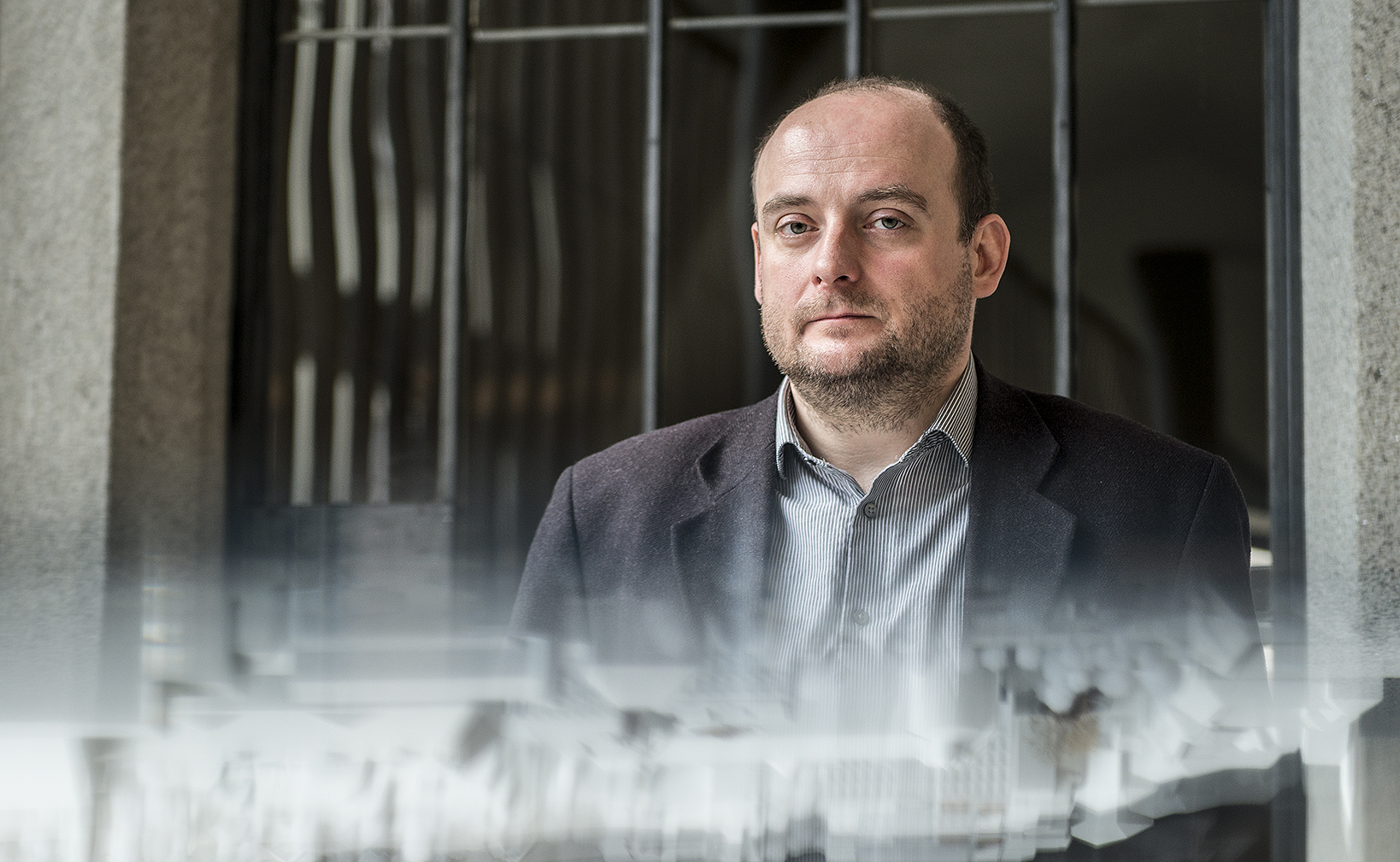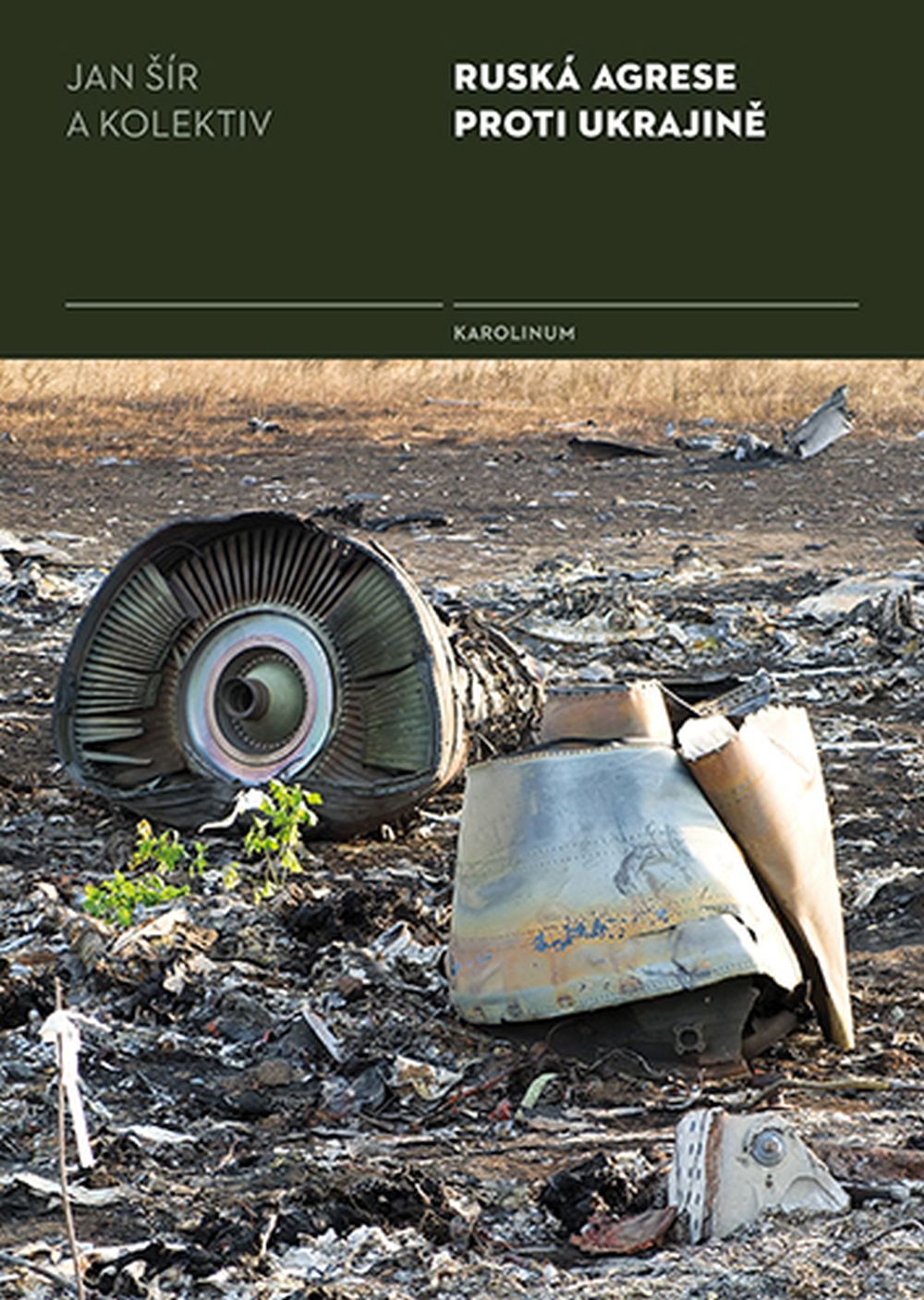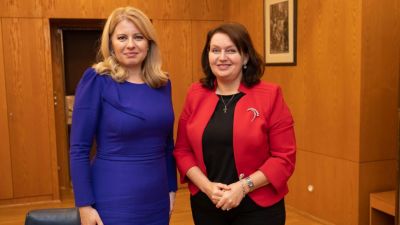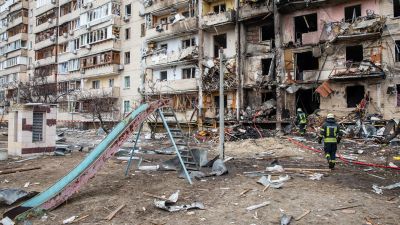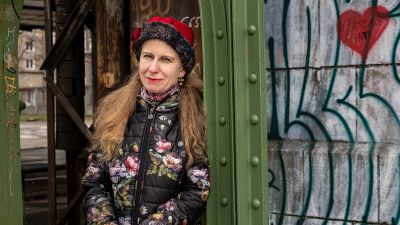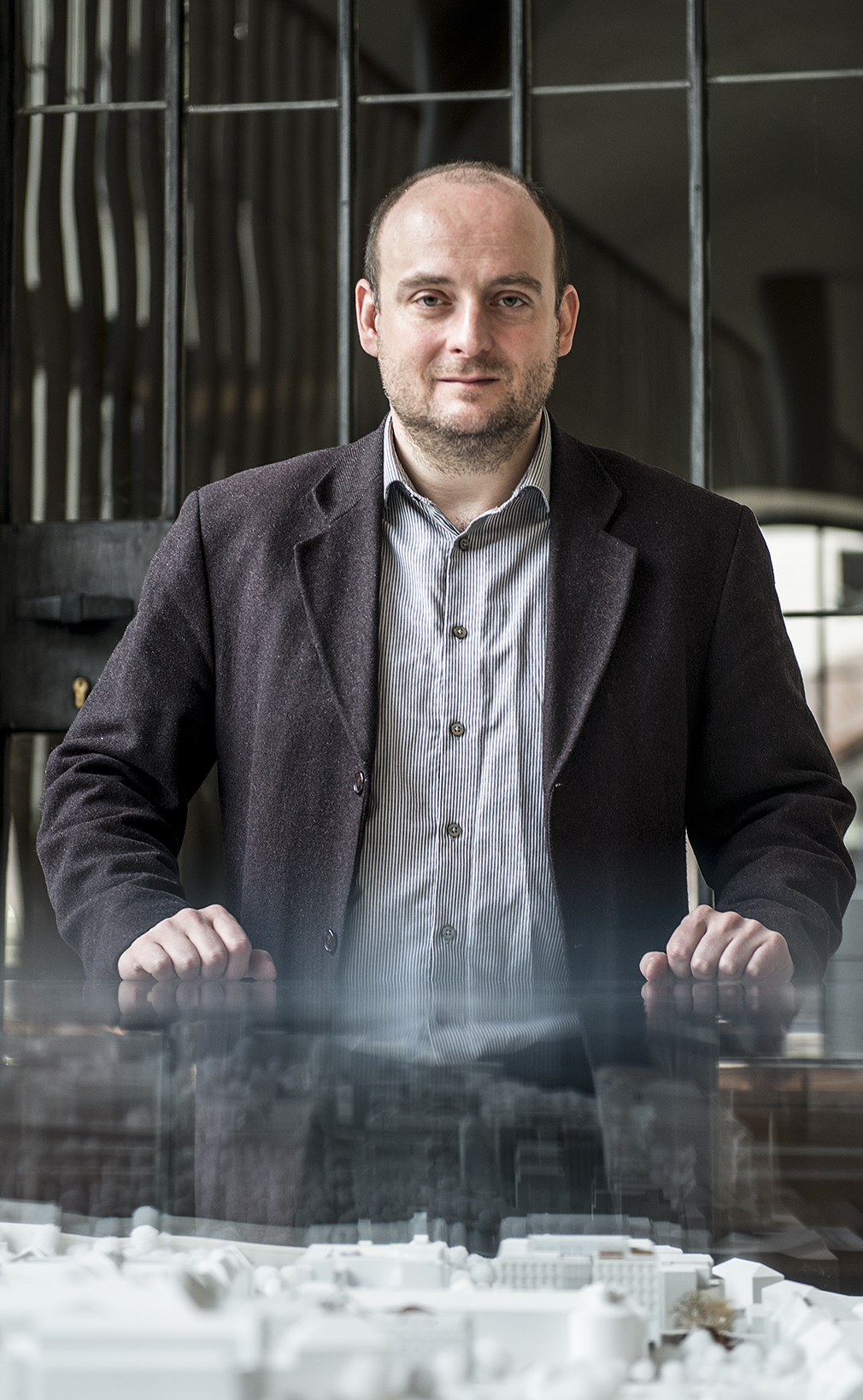 When I asked him recently how well he was sleeping at night, he replied “Better than in the autumn of 2021. Back then, he said, he had already packed his bags. “It was very clear from Russia's actions towards Ukraine where things were heading," says Jan Šír from the Institute of International Studies at the Faculty of Social Sciences of Charles University. The researcher has long focused on political and security developments in the post-Soviet space.
When I asked him recently how well he was sleeping at night, he replied “Better than in the autumn of 2021. Back then, he said, he had already packed his bags. “It was very clear from Russia's actions towards Ukraine where things were heading," says Jan Šír from the Institute of International Studies at the Faculty of Social Sciences of Charles University. The researcher has long focused on political and security developments in the post-Soviet space.
According to Šír, it is now primarily up to the West whether it will tolerate Putin's Russia's complete violation of basic international rules and allow the system of mutual relations drawn after the Second World War to be redrawn.
You probably weren't surprised by what happened on February 24, 2022, were you?
Not really, on the contrary, I have long pointed out that this is the most logical outcome of existing trends that have been evident for a long time and which, for reasons personally don’t understand, were not heeded or received little attention. In this context, I must say that the level of Czech public discourse is absolutely catastrophic: the media, academic centres and the expert community are failing, not to mention the political class. We had a former head of state who long supported and justified the aggressive criminal behaviour of a foreign power that has tried to exert its influence in our country. All of this combined to create a lethal cocktail that could not have resulted in anything else. The almost annihilatory phase of Russia's war against Ukraine, which really began in 2014, has been going on for two years now, and no one cares anymore.
When did you begin to realise that the actions of Putin's Russia were leading towards an all-out invasion of Ukraine?
There were several milestones, starting with Russia's unpunished aggression against Georgia in 2008, the use of chemical weapons in Syria in 2013 by Russia's client Bashar Assad and the support for his regime in general and the waging of war in a totally inhuman way that is completely unimaginable for a European in the 21st century, the aggression in Crimea and the Donbas in 2014, then the Novichok poisoning, the Vrbětice munitions explosion in 2014 and so on... We still thought we things under control. But it turns out we don't. Now, when a regional conflict of this magnitude merges with others that are already smouldering or have erupted - the Middle East, China -Taiwan – these situations could escalate to a conflict of global proportions.
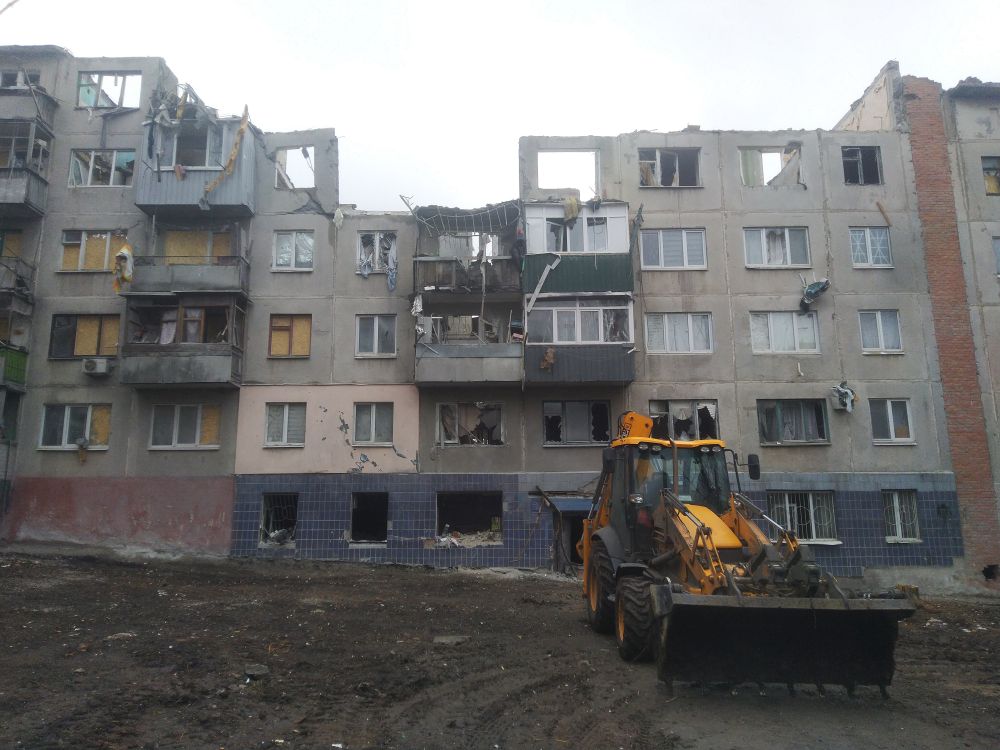
A residential house that was hit by a Russian S-300 missile on April 15, 2023. Fifteen killed, Slovyansk, Donetsk region (Photo: Jan Šir).
Following Russia's annexation of Crimea, you and other colleagues wrote a monograph, Russian Aggression Against Ukraine, published in 2017 by Karolinum Press (a second edition was released late last year). Even then, you described the aggressive features of the Russian government towards Ukraine, Russia's efforts to corrupt European political parties or specific politicians, to influence public opinion at home and abroad by spreading disinformation and hoaxes. Surely you were not the only ones who saw this. How come no one had tried to block Russia by then?
It's a question of the will of all of us to give up a small part of our comforts. It is a difficult situation that requires politicians to take unpopular measures that few dare to take when we have a four-year election cycle in a democracy. We may have many politicians, but we have few real statesmen. In such a situation, you have to start levelling, communicating fairly, with the public. Tell everyone that we are in for a difficult time and that if we don't take these unpleasant steps now, it will cost us a hundred times as much in a year or two. None of the politicians will dare to do that. Shock treatment is the only thing that works, and unfortunately, thousands of people, who have done nothing wrong, are dying in Ukraine now because of this. I would like to thank Karolinum Press, which published the book, because it was quite a courageous undertaking in its time. Unfortunately, the book did not go on sale until after February 2022, even though it outlined how the situation might develop after the annexation of Crimea, and many other things that happened subsequently were already described seven years ago.
In the monograph, you describe, among other things, the Russian military plan against Ukraine, A Clockwork Orange, which appeared in the Russian media as early as 2008 [the name a bleak reference to the famous Anthony Burgess novel and Ukraine’s own Orange Revolution in 2004/2005]. How much is Russia currently following those plans?
The plan was described by my colleague Yuri Fyodorov, who wrote the chapter on Russian aggression in Donbas. This was a military plan for a full-scale invasion of Ukraine that was originally published in the Russian media back in 2008. The question is why it appeared in the media in the first place (independent Russian security expert Yuri Fyodorov, who covered this topic in a monograph, describes the most likely reason for the targeted leak of the plan to the media as Russia's attempt to pressure the Ukrainian government to back down from its intention to join NATO - editor’s note). It describes three main lines of attack and the strategic objective of a full-scale invasion aimed at proving that Ukraine as a national and state project is not viable.
Russia is not only interested in destroying Ukraine, but also in restoring its status as a superpower, and it makes no secret of its ambitions for world domination. It has made no secret of this for some 2, but we still thought it was just a rant aimed at the Russian public inside and did not take it seriously, even when it was backed up by real steps towards the realisation of this plan.
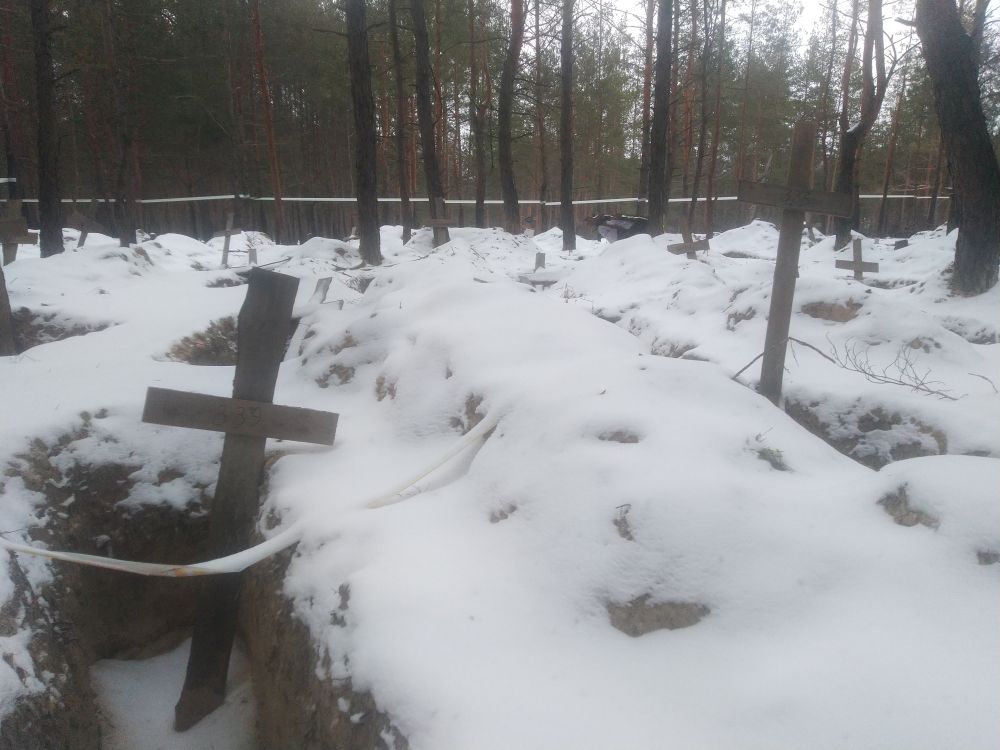
Remains of a makeshift burial site for victims of mass killings of civilians in 2022, Izjum, Kharkiv Oblast (Photo: Jan Šir).
The monograph also includes the sentence that Russian President Vladimir Putin is not a supernatural being to be believed or disbelieved, and therefore one should be prepared for the fact that everything he or his diplomats talk about, he actually thinks and does. If he needs to be taken at face value, what do you expect now?
Mykhailo Samus (a Ukrainian military analyst – editor’s note) develops this idea and writes that any concession is pointless and will only encourage Russian aggressive criminal behaviour because the Russians will see it as weakness and have no reason to change their behaviour if they get away with it. Therefore, it is up to us how we deal with this, and I would like to stress that. To anticipate anything in wartime is a difficult task. In any case, of the possibilities that come to mind, it is good to pay attention to those that may not be the most likely, but which may have the greatest impact.
And these are?
World war. If Ukraine falls, why would the Russians stop and not continue? Few people realise that this is not a war just about which way the Russian-Ukrainian border will go, and whether or not some of Ukraine's territory will fall to Russia, or what kind of government, administration, or international regime will be there. This is very much a war that will determine the shape of the next international order and the rules of international politics. It is a clash of concepts that are incompatible. On the one side stands the democratic West, where the rules of international law are laid out, that is, some things are not permissible because the law forbids them - that includes the fact that you cannot liquidate your neighbour because you do not like him. On the other hand, behind this is the Russian idea that the Russians will control half the world and everyone else will be happy with that.
There are more ways in which this can play out. In my opinion, we need to pay attention to what cannot be ruled out any more, namely that the war will last for some time, and I do not mean days or months, and that it will only end in the total defeat of one side or the other. Now it is a question of which one it should be, whether it is Ukraine, or us, or one of our allies, or Russia, and that is up to us.
I do not understand those who call for negotiations. Russian President Vladimir Putin has broken every agreement he has ever signed. How are you going to find a solution that he will not break again? We have seen this repeatedly since 2014. There have been more than 200 meetings at the Russian-Ukrainian level alone. In the first year of the invasion in 2014, German Chancellor Angela Merkel spoke to Vladimir Putin more than 40 times, it's all documented. What is happening is not the result of too little negotiation. It is the result of one side violating everything it wants to and because its aims are aimed at undermining the entire system based on the UN Charter and the Final Act of the Conference on Security and Cooperation in Europe.
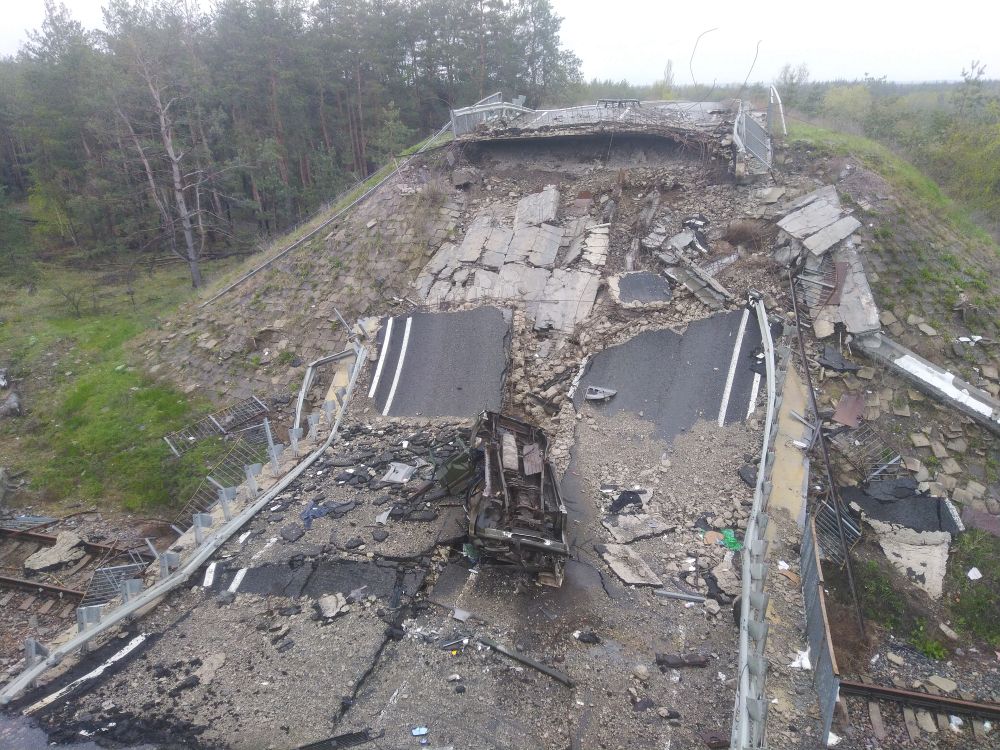
The road to Siversk outside the town of Lyman, Donetsk region. (Photo: Jan Šir).
You spent several months in Ukraine last year. How does one do research in a war zone?
Being in a war zone puts professional challenges in front of you as a researcher, which translates into what you can collect and how. In the field you have to. I can't imagine how anyone can write about Russia or Ukraine if they've never been there in their life. The reality there is different than what we imagine it to be here from our desks. I can study the traditional or the strategic, geopolitical aspect of the conflict here from the literature, but what war looks like in reality, what war looks like at that slightly lower level, and then of course some of the humanitarian aspects, you have to experience that to understand it and to be able to imagine what it really entails.
You have to follow certain rules - not to harm, not to cause problems for the people who are there. In the situation that exists there, there are risks involved, even life-threatening risks. I was very inspired and mentally strengthened when I saw people there who have lost their children, for example, or have permanent effects from war injuries, and yet they continue to help and do what is necessary because they believe it is worthwhile. It will realign your values in life. You will fully realise that the problems we are dealing with here are completely insignificant compared to what is happening in Ukraine, where people are dying in large numbers and where the future organisation of Europe is being decided for decades to come.
If we look at Russia, how does the ordinary Russian population live today? Does anyone know anything about it?
Russia is huge, covering eleven time zones, different ethnicities, with both major cities and depopulated areas, giving any simple answer that describes all spheres of society is impossible. For me, Russia is a huge tragedy. I went there almost every year until 2014. I had friends there, acquaintances, a network of work contacts. But after the annexation of Crimea, that changed. Also, how do you want to cooperate and write a professional paper with someone who tells you that Crimea was simply not annexed? To this day I still have a few friends there with whom I am still in contact, they somehow understand what is going on, but they don't want to talk about it. Many of the residents are completely fanatical. Those who had their heads screwed on straight have already tried to leave Russia. That means there's a big brain drain.
One has to be careful in drawing historical comparisons, but Hitler's Germany is in many ways an absolutely adequate example for what's happening in Russia today, we just don't want to admit it here. Those who point this out are then branded as hysterics, Russophobes, or warmongers. The way in which the Russians are waging war is manifesting itself not only as external colonialism, where they are trying to colonise Ukraine, but also as internal colonialism. They do not send people from the big ethnically Russian cities into the army, but people from the ethnic periphery, such as Yakuts or Buryats. In this way, they are exterminating their own population.
Is there a real possibility of civil war in Russia?
Possibly. The situation could lead to migratory flows, to regional conflicts, to interruptions in the supply of energy resources. There is also the question of what would happen with unified nuclear arms control. These are the consequences that everyone fears. From my point of view, however, it would still be a more acceptable option than what we have now.
Our conversation has understandably been quite heavy, quite dark - do you see any glimmer of light at the end of the tunnel?
There is enough information and there are people who are able to evaluate it and propose a way forward based on it, including policy. We just lack a leader. This whole situation is not about whether or not we like Ukraine. It is about the elementary instinct of self-preservation. If Ukraine falls, our defence spending will have to increase exponentially because it will mean, firstly, that we will have an aggressive enemy country closer to our borders and, secondly, that Vladimir Putin's aggression will have paid off. So why would he not continue with it if it got him results? It will mean a subversion of the international order, meaning that anyone who thinks of it can attack anyone they want and get away with it. It is up to us whether we allow this to happen.


